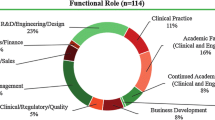Abstract
We describe a new model of graduate education in bioengineering innovation and design- a year long Master’s degree program that educates engineers in the process of healthcare technology innovation for both advanced and low-resource global markets. Students are trained in an iterative “Spiral Innovation” approach that ensures early, staged, and repeated examination of all key elements of a successful medical device. This includes clinical immersion based problem identification and assessment (at Johns Hopkins Medicine and abroad), team based concept and business model development, and project planning based on iterative technical and business plan de-risking. The experiential, project based learning process is closely supported by several core courses in business, design, and engineering. Students in the program work on two team based projects, one focused on addressing healthcare needs in advanced markets and a second focused on low-resource settings. The program recently completed its fourth year of existence, and has graduated 61 students, who have continued on to industry or startups (one half), additional graduate education, or medical school (one third), or our own Global Health Innovation Fellowships. Over the 4 years, the program has sponsored 10 global health teams and 14 domestic/advanced market medtech teams, and launched 5 startups, of which 4 are still active. Projects have attracted over US$2.5M in follow-on awards and grants, that are supporting the continued development of over a dozen projects.



Similar content being viewed by others
References:
Blank, S. Why the lean start-up changes everything. Harvard Bus. Rev. 91(5):64, 2013.
Boehm, B. W. A spiral model of software development and enhancement. Computer 21(5):61–72, 1988.
Clem, M. Personal Communication, December 12, 2012.
Krummel, T. M., M. Gertner, J. Makower, C. Milroy, G. Gurtner, R. Woo, D. J. Riskin, G. Binyamin, J. A. Connor, C. M. Mery, B. M. Shafi, and P. G. Yock. Inventing our future: training the next generation of surgeon innovators. Semin. Pediatr. Surg. 15(4):309–318, 2006.
Lerner, A. L., B. H. Kenknight, A. Rosenthal, et al. Design in BME: challenges, issues, and opportunities. Ann. Biomed. Eng. 34(2):200–208, 2006.
Yazdi, Y. Developing innovative clinicians and biomedical engineers: a case study. Am. J. Prev. Med. 44(1):S48–S50, 2013.
Zenios, S. A., J. Makower, P. G. Yock, T. J. Brinton, U. N. Kumar, L. Denend, and T. M. Krummel. Biodesign: the Process of Innovating Medical Technologies. Cambridge: Cambridge University Press, 2010.
Acknowledgments
Charles Montague, PhD, BME Department Business Director assisted in the description of follow-on funding programs. Michael Clem, PhD, developed the application of the Spiral Innovation Model to medical device innovation and assisted the authors with details and insights into that model. Funding for the CBID MSE program has been provided by Richard M Swirnow. Major funding for CBID’s Technology Acceleration Fund has been provided by Johnson & Johnson, BD Medical, and GSK. Funding for the Day of Birth Alliance has been provided by Laerdal Global Health. Additional support for CBID’s Global Health projects has been provided by the GE Foundation, GSK, and Jhpiego. Funding for scholarships has been provided by the Medtronic Foundation. CBID and student projects have received several program and project specific grants form the National Collegiate Inventors and Innovators Alliance (NCIIA).
Conflict of Interest
The authors report no conflict of interest.
Author information
Authors and Affiliations
Corresponding author
Additional information
Associate Editor Andrew DiMeo oversaw the review of this article.
Rights and permissions
About this article
Cite this article
Yazdi, Y., Acharya, S. A New Model for Graduate Education and Innovation in Medical Technology. Ann Biomed Eng 41, 1822–1833 (2013). https://doi.org/10.1007/s10439-013-0869-4
Received:
Accepted:
Published:
Issue Date:
DOI: https://doi.org/10.1007/s10439-013-0869-4




